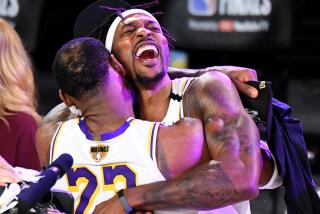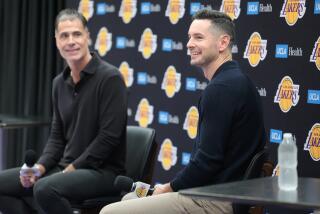Maestro of Manchester : Laker Owner Buss May Live and Act Like a Playboy, but He Hasn’t Let That Stand in Way of Success
- Share via
Night life. Playboys like the night life. Restaurants. Clubs. And don’t forget the women.
“Plays poker all night,” Jerry Buss jumps in, helping out in the description. “Dances, quite frequently. Lets see, what else do playboys do? Oh. They usually go out with very pretty girls. I do that. That’s about it. I probably don’t read as much as you do. Like Dennis Rodman.”
Not that Buss wants to be compared with Rodman.
“Nah,” the Lakers’ 64-year-old owner says. “He’s not in my ballpark.”
Buss chuckles, a laugh that comes from deep in his throat.
“He’s more laid back.”
More laid back?
“Right.”
Buss stops.
“Nah,” he says. “I’m kidding.”
About the Rodman part maybe. Everything else, no.
A few weeks shy of the 18th anniversary of his buying the Lakers, Kings and Forum from the late Jack Kent Cooke, Buss remains the kid in the fantasy store. He has five NBA championship trophies filling the credenza just behind the desk in his Forum office and the real possibility he’ll need a bigger piece of furniture in a few years. And he has the pursuits of things not basketball, all of it adding up to . . . wins, women and song?
“I’m not sure what that word means,” he says, still trying to decide if he’ll wear the “playboy” mantel so many have hung on him. “In the normal context, I guess the answer is yes.”
So he accepts it. But the uniqueness of the self-made millionaire who started with a $1,000 investment in a West Los Angeles apartment building, the man about town, philanthropist, man about other towns, entrepreneur, NBA innovator-turned-power broker, world traveler, is that there is no such thing as “the normal context.”
He has broken new ground in the sports world with contracts given to Magic Johnson (25 years at $25 million, then an unheard-of figure) and Shaquille O’Neal (seven years at $120 million, still an unheard-of figure) and allowed a strain on the Lakers’ salary cap when, out of loyalty, he continued to pay Johnson and James Worthy significant amounts even after they had retired.
He has developed a unique relationship with Johnson. What began as an owner-player connection has evolved into something more like a father-son association. Buss serves as Magic’s business advisor one day and running mate for a Vegas weekender the next.
And when Johnson learned he was HIV-positive, Buss pored over the pamphlets and talked to doctors to the point that, as his protege recalled, “It was like he had it.”
He is down to earth in appearance, always in jeans at Laker games, usually with a collared shirt unbuttoned to the chest, always sitting in the same place at the Forum, high above the court in the end zone closest to the visitor’s bench, nowhere near the so-called best seats. Buss prefers this view because, he says, it allows him to see the plays develop. Only once in the 18 years has he sat downstairs at a home game, in the late 1980s when he was closing the Forum sponsorship deal with Great Western.
He is down to earth in attitude.
“I don’t think I’ve ever heard anybody bad-mouth him,” said Utah Jazz owner Larry Miller, a big Buss supporter.
And there aren’t many NBA people you can say that about.
“Maybe four or five,” Miller said. “And probably not including myself.”
Timing has been a big part of Buss’ success. By luck or planning, he bought the Lakers just as the NBA was about to take off, barely after Johnson and Larry Bird had played their memorable NCAA championship game in Salt Lake City and just before they would energize the entire league with a coast-to-coast rivalry.
He got Magic by luck, a coin flip, then took it from there. He wanted a live band at home games. He wanted Laker Girls. He wanted an atmosphere.
Voila, Showtime!
“With the personality, he’s one of the easiest-going, nicest kind of gentlemen you’ll meet,” said John Bitove, the original owner of the Toronto Raptors. “He really is a gentleman. Business-wise, you knew he had it. I mean, his track record speaks for itself.
“Courtside seating, regional cable TV, even just one of the first owners to recognize that owning the building as well as the team allows you to make more money, as opposed to being a tenant. He blazed the trail that way.
“To be honest, I think he’s one of the few owners in the NBA who really understands the full aspect of the business--where the revenue streams are and what you have to do to maximize. At the end of the day, teams that can discover more ways to make money have the highest salary structure, which allows them to have the best players, which allow them to win a championship. He’s one of those owners.”
And one of these:
Buss is a true behind-the-scenes power in the league with a twist, commanding because he isn’t demanding. His approach matches his attire--casual, comfortable, unpretentious.
He has other owners’ respect, so he’s on several committees and recently completed a second term as chairman of the board of governors, a job now held by Gordon Gund of the Cleveland Cavaliers. Eighteen years had a lot to do with it, and so did the financial and actual achievements of his team, but a calendar can’t command respect. Buss can--and does.
“From my own perspective, I would say he is the single most influential owner in the league,” Miller said. “And the interesting part of it is, he’s not the noisiest. There are other guys who do more table pounding or chest pounding, but Jerry is a little bit of the--what is it?--the E.F. Hutton. When he speaks, everybody listens. I really think that’s true of Jerry because he is pretty soft-spoken in the meetings. He doesn’t ever speak frivolously, so when he speaks he’s listened to.
“I think the success and the city he’s in both carry some [weight]. I think those factors would be there for anybody who owns the Lakers, but most people could not take proper advantage of it.”
The most influential? Buss hesitates at the thought, then says he doesn’t know.
But the understated approach? That much he is sure of. It’s a conscious decision, after all.
“I think it’s better to be heard infrequently and people tend to listen more to what you say,” Buss said.
They’ve been listening a long time now. He can remember being at one meeting when Abe Pollin of the Washington Bullets started expressing surprise at being in his 18th year, and Buss shook his head and thought, “Nobody can own a team 18 years.”
And here he is. Buss looked up one day, and suddenly he was part of the old guard himself, about to hit the big one-eight himself. Much to his amazement, of course. Once, in an earlier time, he slid a note to daughter Jeanie at a meeting of the board of governors with the exclamation of just how high he had climbed on the seniority list.
“He couldn’t get over that,” she said.
But if it feels strange, Buss has no plan to step back and give his kids the team, and definitely no plan to sell, as Peter O’Malley is doing with the Dodgers. The concession to the hassles of running an arena is that Jeanie is in charge of the Forum. But one way or another, the current building, or the one the Lakers hope to move into with the Kings, will be a Buss stop for years to come.
“As far as I can see in the future,” he said.
Buss has $211 million invested in the Lakers in player salaries alone, and that figure is almost sure to grow significantly during the summer when one of his starters, Robert Horry, becomes a free agent. But more than that, Buss has an emotional investment.
He talks of doing this for another 10 years, with only minor requests: a few more titles and his hair returning to black. But he’ll settle for the first part.
“We had so much success when I first started that that has to be enjoyed, to win the championships,” Buss said. “We haven’t had that kind of success lately, so that part of the joy is missing. But just the day-by-day joy of owning a team is still there.”
Joy?
“It’s something I guess everyone would fantasize about. To own a team, win or lose, and control the fortunes and make the trades. I mean, every man I’ve ever talked to in my life I think would envy that position. To be in it creates a lot of joy because I don’t have any envy. It’s just, I’m here.”
Which means he’s everywhere. He likes to travel, especially to Hawaii. He’s around Los Angeles. He’s around the Forum, in his office a few days a week depending on what’s going on, upstairs in his seats, even occasionally in the locker room, though not as much as before.
“Probably most owners, that’s the only time they see their players, in the locker room,” Buss said. “But I see them at the discotheques and the restaurants. I’m out in the same places they are, so as a result, I see them all the time.”
That’s different in this day and age when so many owners are corporate types, if not actually corporations.
“Partially that,” Buss said, accounting for the difference. “And partially they probably don’t like discotheques as much as I do.”
More to Read
Go beyond the scoreboard
Get the latest on L.A.'s teams in the daily Sports Report newsletter.
You may occasionally receive promotional content from the Los Angeles Times.










